Daycare Program 2
Full Time Program
The Full Time Program operates Monday through Friday from 7:30am to 5:30pm. Families have full access to the programs during our hours of operation, though there is no expectation that the children must arrive or depart at a set time within these hours.
We are licensed to provide full time care for 67 children between the ages of 18 months and 5 years. This includes 15 toddlers (18 months to 30 months) and 24 preschool children (31 months to 44 months). Our programs are open to all families including those in receipt of subsidy from the City of Ottawa.
Within our Full Time Programs we have a Toddler Program, a Junior Preschool Program and a Senior Preschool Program and a Kinder Program which is an enriched alternative to school based Kindergarten.
Full Time Toddler Program
Our Toddler Program is offered to children aged 18 months to 30 months and we have space for 15 children. The Educator-to-child ratio is 1:5 between the hours of 9:00am to 3:30pm but can go to 1:7 outside those hours.
All the children follow the same daily schedule, which is finely tuned to meet their developmental needs. Our innovative Toddler Program is structured with set snack, lunch, nap and outdoor play times, as outlined in the Toddler Schedule below.
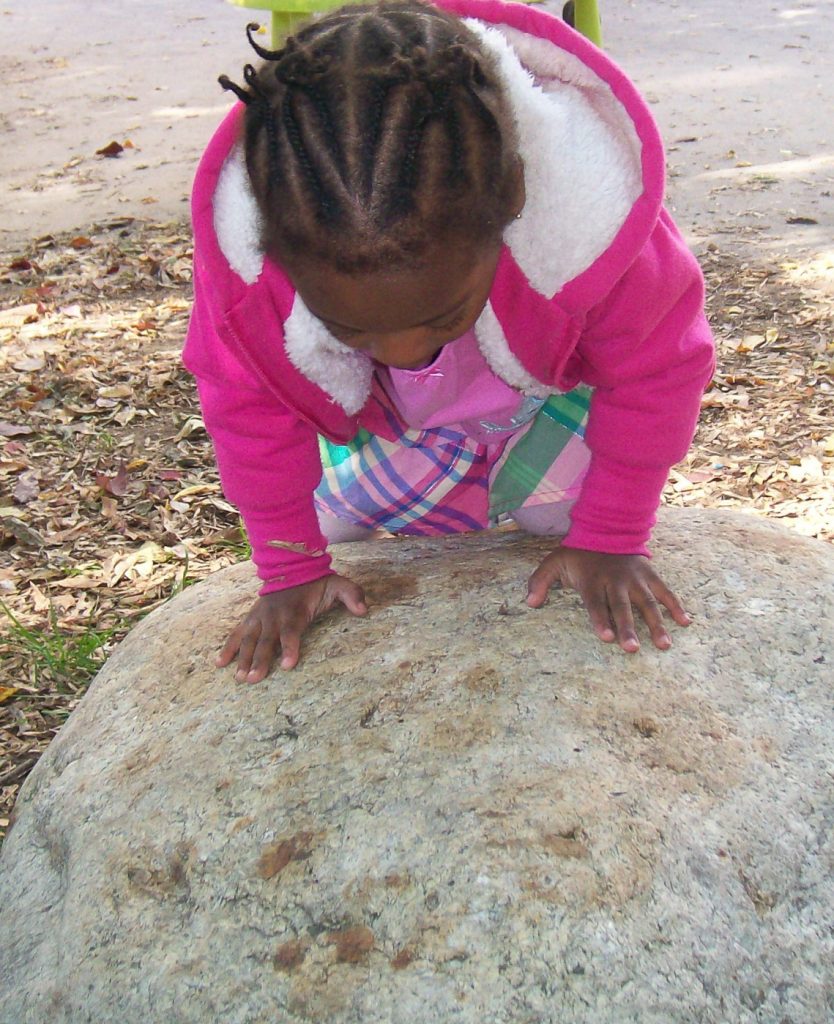
One part time and three full time Educators facilitate the program and provide age-appropriate learning opportunities based on their observations with the children. We are continuously designing fresh and challenging programming to encourage language development, independence and group play to meet the social and emotional needs of your child.
Our curriculum includes developing skills in the areas of language, an introduction to mathematical concepts (such as sorting and grouping), creative arts and physical activity. Our experienced Educators combine meeting the Ministry requirements with a curriculum based on the interests of the children.
The program focuses on valuing and enhancing the unique personality and developmental skills of each toddler in a safe, happy and nurturing environment. We appreciate how difficult it can be for parents to leave their child with us, which is why we’ve created a process that takes into account the needs of both the parents and the toddler and integrates your child into the program in a gradual way.
The core values underlying our Toddler Program are
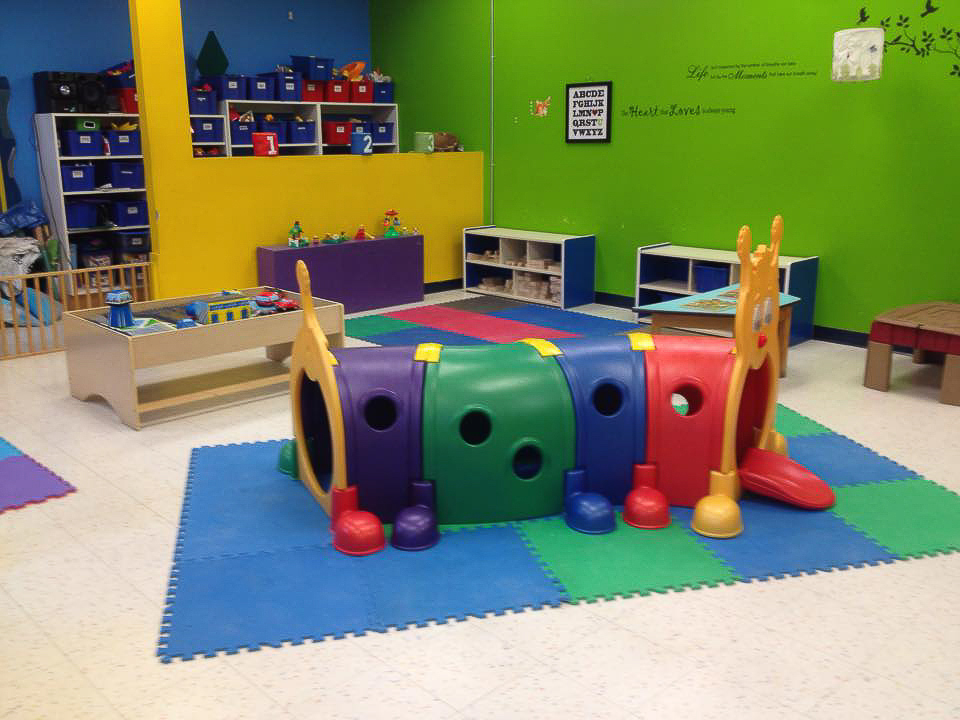
- Our Educator-to-child ratio is 1:5 as we believe small groups allow Educators to get to know each child’s unique personality and skills;
- Positive social interactions with the Educators and the other toddlers help build social and self-regulation skills, control over their emotions and confidence;
- Toddlers thrive and build independence in an environment that combines self-directed play with Educator guided learning;
- Play-based and ELECT-based learning is dynamic and allows toddlers to stretch themselves and push their individual learning boundaries;
- Our curriculum is designed to encourage taking initiative, exploring and building self-esteem;
- Physical activity and sound nutrition are essential parts of a healthy learning environment.ploration, play and inquiry.
We believe that is important to have a strong connection with our families so that we can work together as a team to nurture our toddlers’ development. You are the experts on your child and your input is important.
We recognize and build on the strengths of families and the love they have for their child, to help enhance our program. We encourage you to share any adventures your child may have had over the weekend, anything you notice that they may enjoy sharing with their friends at day care, any new developments or struggles and any special talents that you would like to share with our program. This helps provide responsive programming that is meaningful to the children.
A variety of activities are provided during morning play that reflect your child’s interests. Through our observations of your child and our interactions with you, we provide environments and experiences to engage our children in active, creative and meaningful exploration, play and inquiry.
Communication
Each day we write a summary of your child’s day with us: what they had for lunch, how long they slept, and other important messages or stories to share.
Diapering & Toilet Learning
Parents are responsible for providing diapers, creams and wipes. Each child has a special bin labelled with their name, where their supplies will be kept. The diapers, supplies that you provide will be used for your child only.
When a child begins to show signs of being ready for toilet learning, we will happily work with you and your child. We have a package of information on toilet learning for you, and will be happy to answer any questions you might have. If you think your child is ready, talk to us. We want to work together and make this learning process as happy and successful as possible.
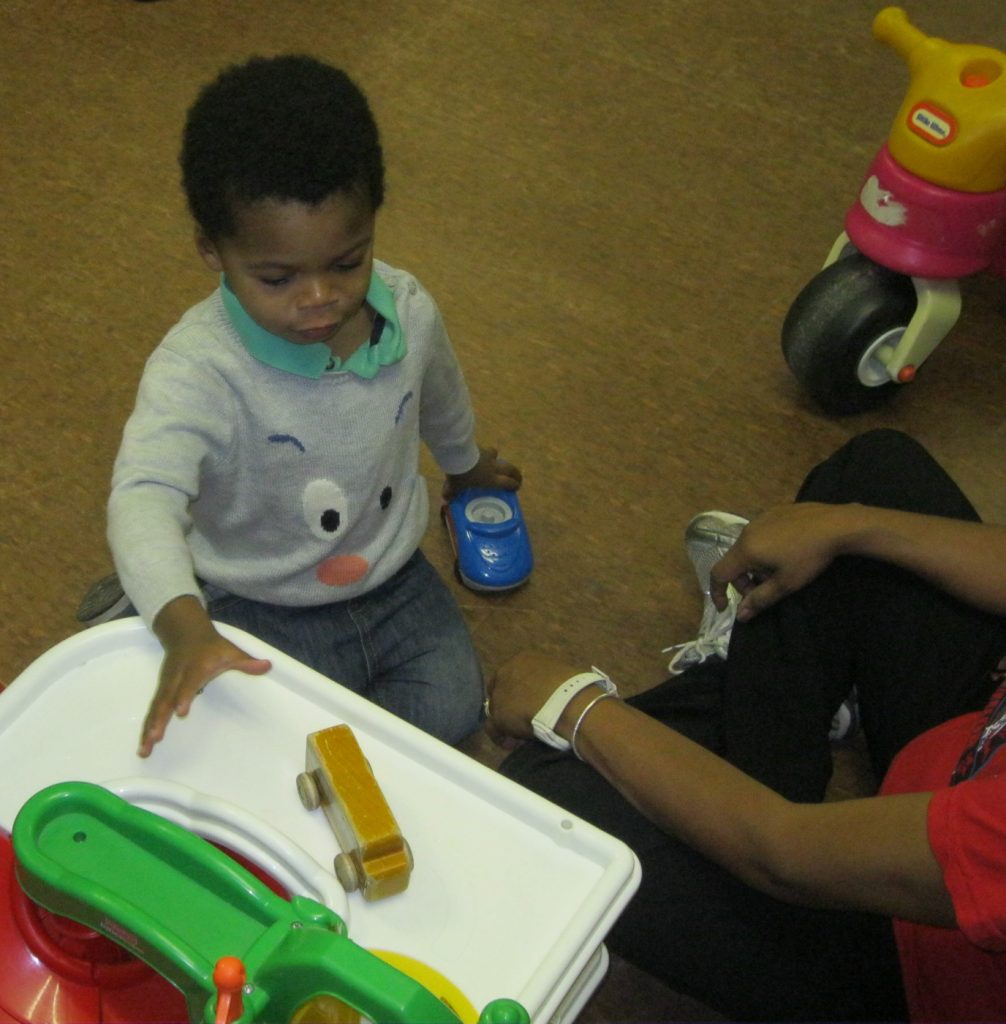
Nutrition
Meals are a very social time. Self-help skills are encouraged, but of course, help is available for those who need it. The children sit at the same table with the same Educator each day. Children must be sitting while eating and drinking. They are encouraged, but not required, to taste everything. We take into consideration that children’s appetites change from time to time. Their likes and dislikes of certain foods also change. Children drink from cups with or without lids during lunch and snack times. Children’s allergies are posted in the playroom and in the kitchen, so that all of the staff that interact with the children are informed and aware.
Sleep Routine
In our sleep room each child has their own cot. If your child has a soother, special blanket, pillow or soft toy that would make them feel more comfortable, we encourage you to bring it in. The sleep room is darkened, with quiet music and a fan. There is always an educator with the children. Naptime usually starts at 12:15 p.m. and ends at 2:45 p.m. at the latest. Children go into the sleep room in staggered, small groups. We encourage the children to fall asleep on their own, but we will rub backs, etc., to help them settle.
For those who wake up early we have a Wakers’ Program in the playroom. There are quiet activities set up for the children to explore as they wake.
Clothing
Each child needs to have at least one or two extra changes of clothes (shirts, pants, socks) at the daycare so that wet or soiled clothes may be changed, as needed. They will have their own cubby in which to store their extra clothes and a hook to hang their outerwear on.
When children are first toilet learning, 4 to 6 sets of pants, underwear or training pants, extra shoes (we strongly recommend sandals or easily washable shoes for the toilet learning times!) and socks will be needed.
Children need to be prepared to go outside at all times with boots, jackets, hats, sun screen, etc., according to season.
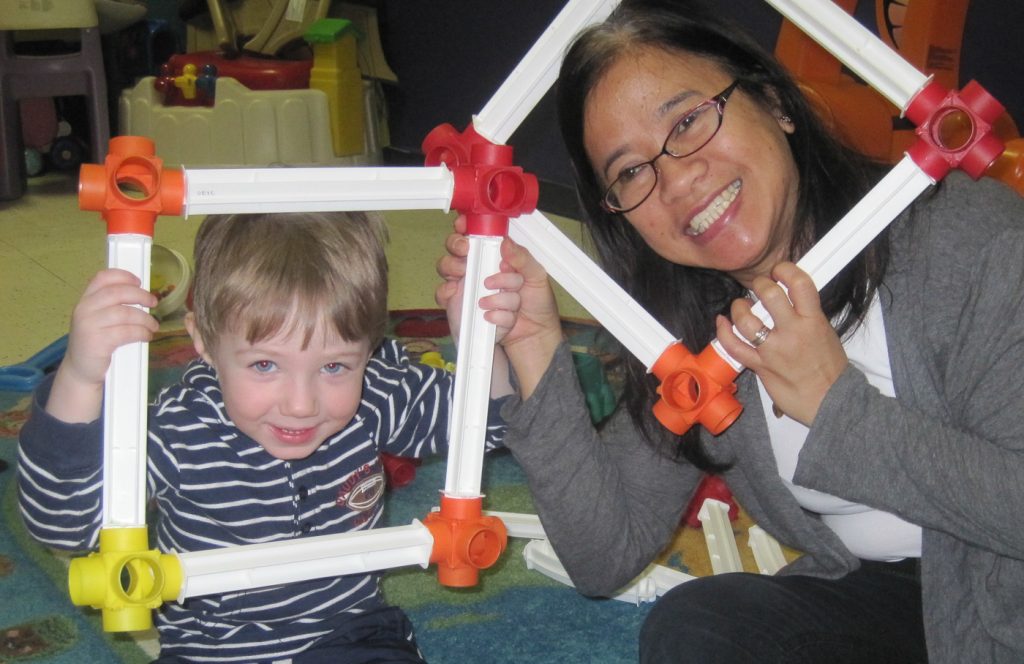
Safety
Safety is always a consideration in our room and children are with the Educators at all times.
Learning Environment and Fostering Developmental Growth
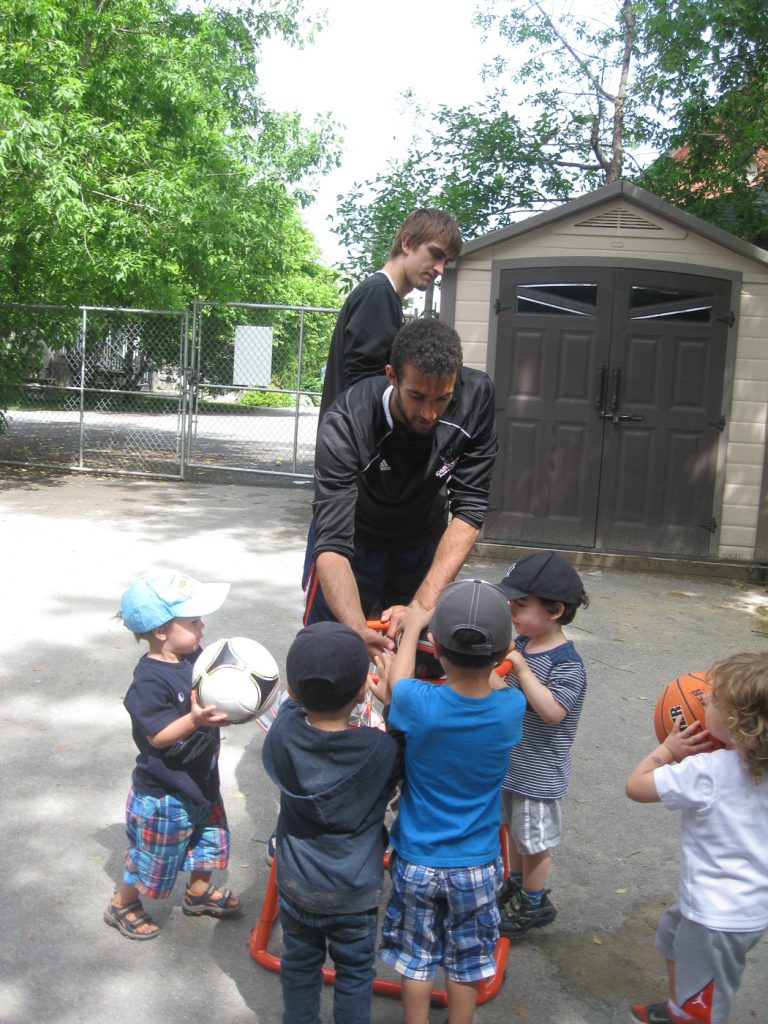
We set up the environment with the set purpose of engaging the children’s need to explore with their minds, bodies and their senses. Play is more than just “fun” for toddlers. It’s how they learn, how they work out who they are, how the world works and where they fit into it. Play is essentially a child’s “work” and helps their brains grow while also being a lot of fun. Play helps build confidence, develop social skills, language and communication, learn about caring for others and the environment and develop physical skills. With this in mind, our daily activities may include creative, sensory, block play, cognitive, music or gross motor focused activities.
- Creative activities can consist of anything from gluing to painting. Children are encouraged to explore any way they choose which may be using their hands instead of a brush. We focus on the process not the product.
- Sensory play is enjoyed by all the children in the program and they are using this time to develop all their senses, and often a love of getting messy.
- Block play is a time to construct and break down things. It is great fun to build a tall tower and then knock it down. It gives us a time to interact with our peers and practice our cooperative skills.
- Dramatic play helps children identify with the world around them and helps them and who they are becoming. It also begins building life skills for the future.
- Cognitive activities help us start to develop our problem solving skills such as how does the puzzle go together, and to learn new concepts including colours, shapes etc.
- Gross Motor activities give us a sense of how are bodies work. We can jump, run, push a ride on toy with our feet and climb the climber, with active play and physical exploration we are gaining self-control and levels of independence.
Curriculum
In our program, we follow How Does Learning Happen? Ontario’s Pedagogy for the Early Years and the Ontario government’s early learning framework, ELECT (Early Learning for Every Child Today). The activities that we provide on a day to day basis stem from the needs and interests of the children. The Educators act as facilitators and expand the program based on what happened the day before or what is happening at the moment. This concept is based on countless hours of observation and documentation. We provide write ups, program plans and photographs for each other as well as for parents and the children. This helps us to communicate what is happening on an ongoing basis. This responsive concept of curriculum “planning” fosters individuality and creativity in each child because it is so flexible.
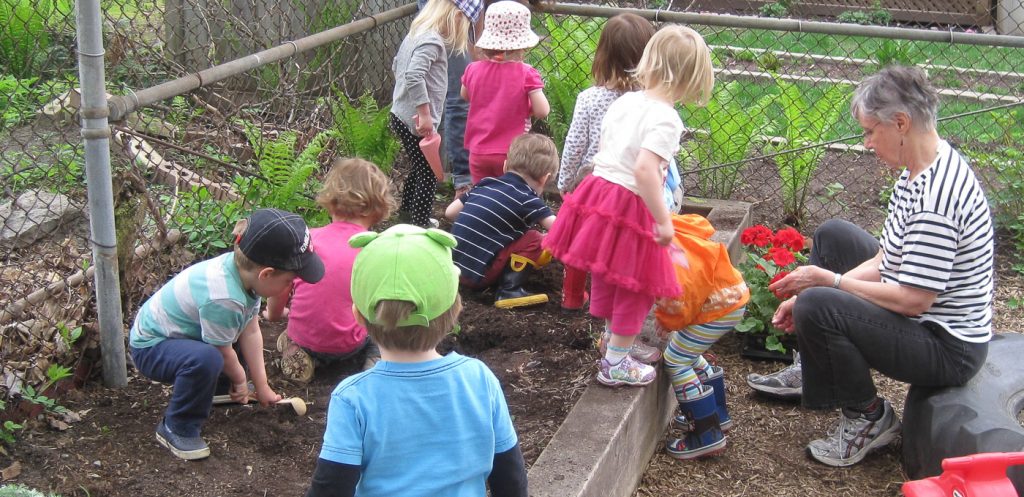
The hands-on learning environment allows children to change and manipulate their environment according to what they need at any particular time. This enables the children to think and make decisions for themselves, therefore making them feel empowered, which is a huge goal for the children in our Toddler Program. If the children are interested in taking flour from the sensory bin and adding it to the kitchen, they can!
We have three basic rules in this program: safe bodies, safe feelings, and safe equipment. By providing a play-space with fewer restrictions and rules, we believe that the children are more in control of their environment. It is a place that truly belongs to them. This in turn creates a room full of happy children, happy families and happy Educators.
Daily Schedule
| 7:30 | Welcome/ A variety of engaging activities will be provided in all the areas of the program |
| 9:30 | Outside activities (diapering and toilet learning routines before going outside) |
| 10:30 | Return Indoors (earlier in Fall & Winter) |
| 11:00 | Lunch and Socializing/ Hand Washing |
| 11:45 | Bathroom routine and free play |
| 12:15 | Nap Time |
| 1:30 | Waking up/Bathroom routine/Free Play |
| 3:00 | Snack Time |
| 5:15 | Activities Tidied/Children start dressing for departure |
| 5:30 | Centre Closed |
* Please note this schedule is a guideline only and subject to change based on the needs of the children.
Full Time Child Care Program Parent Handbook
Fees
The daily rate for the Full Time Toddler Program is $67.99 (2016)
Full Time Junior Preschool Program
The Junior Preschool Program “juniors” is offered to children aged 2.5 to 3.5 years, with a maximum of 16 children. The Educator-to-child ratio for this program is 1:8 from 9:00am to 3:30pm and can go to 1:12 outside those hours. Our juniors’ team consists of one part time and two full time Educators who are warm and friendly and help support and encourage the juniors as they play, learn and grow.
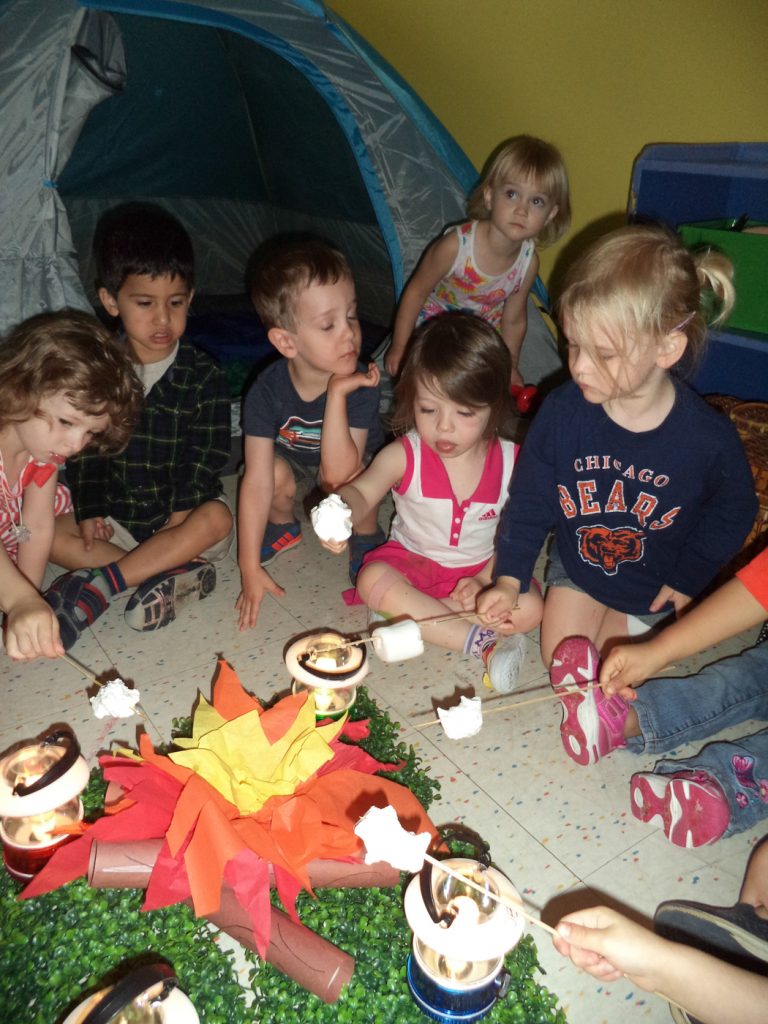
The Junior Preschool Program “juniors” is offered to children aged 2.5 to 3.5 years, with a maximum of 16 children. The Educator-to-child ratio for this program is 1:8 from 9:00am to 3:30pm and can go to 1:12 outside those hours. Our juniors’ team consists of one part time and two full time Educators who are warm and friendly and help support and encourage the juniors as they play, learn and grow.
The juniors enjoy a curriculum that includes many hands on activities. As with all Mothercraft programs, the curriculum combines meeting the Ministry requirements with building on what is interesting and exciting to the children as inspiration for learning activities.
Some areas juniors will explore in the program include painting, storytelling, an introduction to science, French language, basic vocabulary, social greetings, music and more. We also explore our community by enjoying walks through our beautiful neighborhood and visits to the parks. Along the way, we talk about the things we encounter and bring ideas and artifacts back to our room to explore.
Additionally, the juniors learn from their Senior Preschool buddies during regular interactions throughout the day and time spent together in the play yard. The interaction supports them in building their independence and self-help skills.
We believe that is important to have a strong connection with our families so that we can work together as a team to nurture our preschoolers’ development. You are the experts on your child and your input is important.
Learning Environment and Fostering Developmental Growth
As Educators we understand and appreciate the fact that every child is unique in how they learn, play and explore the world. In order to better understand specific individual needs, strengths and interests, we get to know the children through observation and our interactions with them. With that in mind, we are able to provide creative and challenging opportunities for your child.
Following the Ontario Governments early learning framework ELECT (Early Learning for Every Child Today) and HDLH (How Does Learning Happen: Ontario’s Pedagogy for the Early Years) our program is designed specifically to encourage your child to learn through play. The room environment allows for exploration with many materials and activities such as sensory materials, creative/art mediums, building blocks of all kinds, dramatic play props, puzzles and games, books and so much more… Throughout or curriculum and our play environment we incorporate the four developmental domains of ELECT; social, emotional, cognition and communication, language and literacy as well as the four foundations of How Does Learning Happen; Belonging, Well-being, Engagement and Expression.
Our program uses a pedagogical approach to teaching in that we strive to understand and support learning in each child as an individual. We do this by forming a positive and responsive relationship with each child as well are their family; providing environments in which children learn through exploration, play and inquiry; encouraging families to share with us their unique strengths, contributions and perspectives. We share what the children are learning through a variety of documentation forms- pictures, stories, questions etc. to showcase and help understand children’s learning and development and to make the children feel proud of themselves.
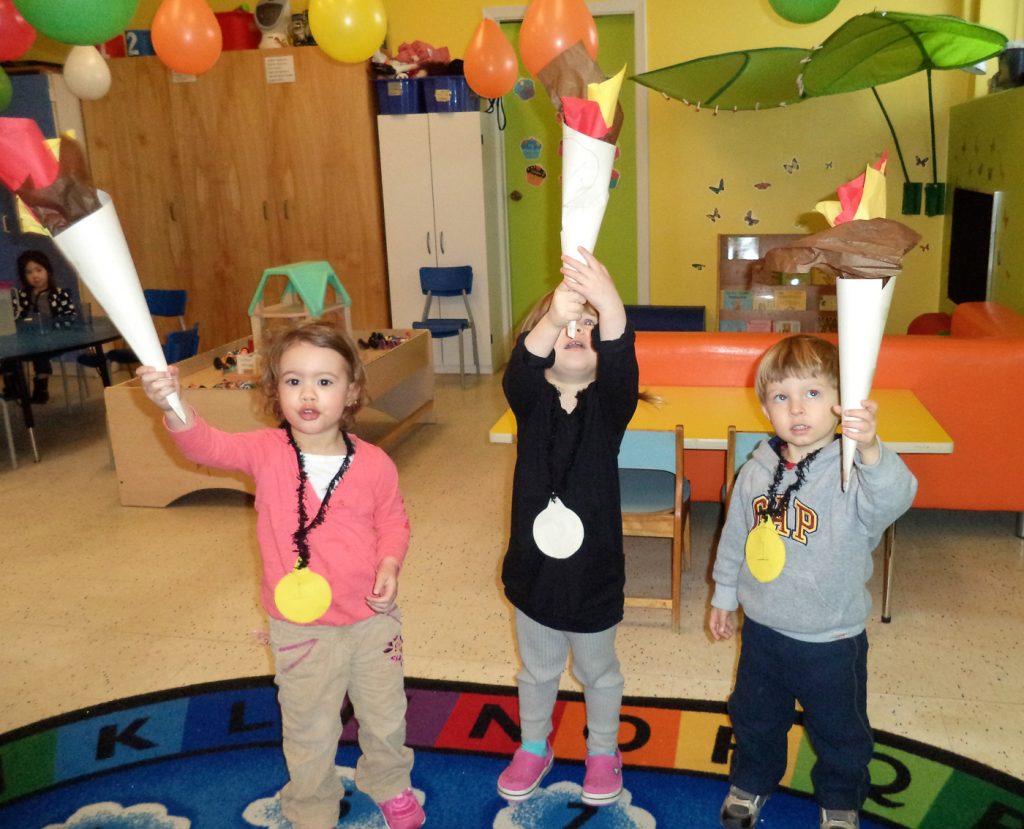
Junior Preschool Developmental Goals
Language Development
- To comprehend more complex directions and instructions
- To use clear and structured 5+ word sentences
- To expand vocabulary recognition (Day to day vocabulary as well as concept related vocabulary)
- To be able to express needs and interests (I am hungry, I am tired, etc)
- To ask relevant questions
Physical Growth
- Continued development and control of fine motor movement (Manipulating writing materials, blocks, small beads etc.)
- To gain body control and balance (Riding larger toys, running, jumping and climbing with balance)
- To practice hand-eye coordination (Puzzles, printing)
- To be able to dress themselves with little assistance (for the day as well as outdoor clothes and shoes)
- To master meal time skills (staying seated in the chair, using appropriate utensils etc.)
- To practice and master toilet learning
Social Emotional Development
- To practice cooperative play (turn taking and working together)
- To explore dramatic play in order to understand the various roles in society (Role Play)
- To gain an appreciation for other’s feelings and emotions
- To build self-regulation skills (Understanding that your actions affect others)
- To continue developing a sense of self-worth and identity
Cognitive Development
- To be able to retain new information (Understanding of new concepts such as weather, days of the week, seasons, months)
- To develop letter and number recognition (Recognize the letters from their name, recognize every letter from the alphabet)
- To develop and increase attention span and task orientation skills (Circle time)
- To learn new concepts such as colour, shape, size, opposites etc.
- To practice decision making skills in a safe environment (Deciding where to play, who to play with)
- To develop problem solving skills (Puzzle’s, cooperative games)
The four constants in our program are meals, rest time, bathroom and outside time.
Nutrition
We provide morning snack, lunch and afternoon snack prepared by our professional cook. She has put together healthy, delicious menus that follow the Canada Food Guide. The children are encouraged, but not required to try all foods offered to them. They are expected to sit in a chair for meals; drink from open-faced cups and are encouraged to use appropriate utensils. The Educators eat with the children to model good eating habits and table manners. The children are expected to be able to feed themselves and gain independence by asking for more of what they like, and scraping and putting away their own dishes. Morning snack is open-ended so the children can decide if they would like to sit and eat, while for lunch and afternoon snack the children are expected to sit at the table. Meals are a lovely time for socializing with peers, sharing stories and reflecting on the day we have had together. Our menu plan is posted just outside our room on the Parent Info Board.
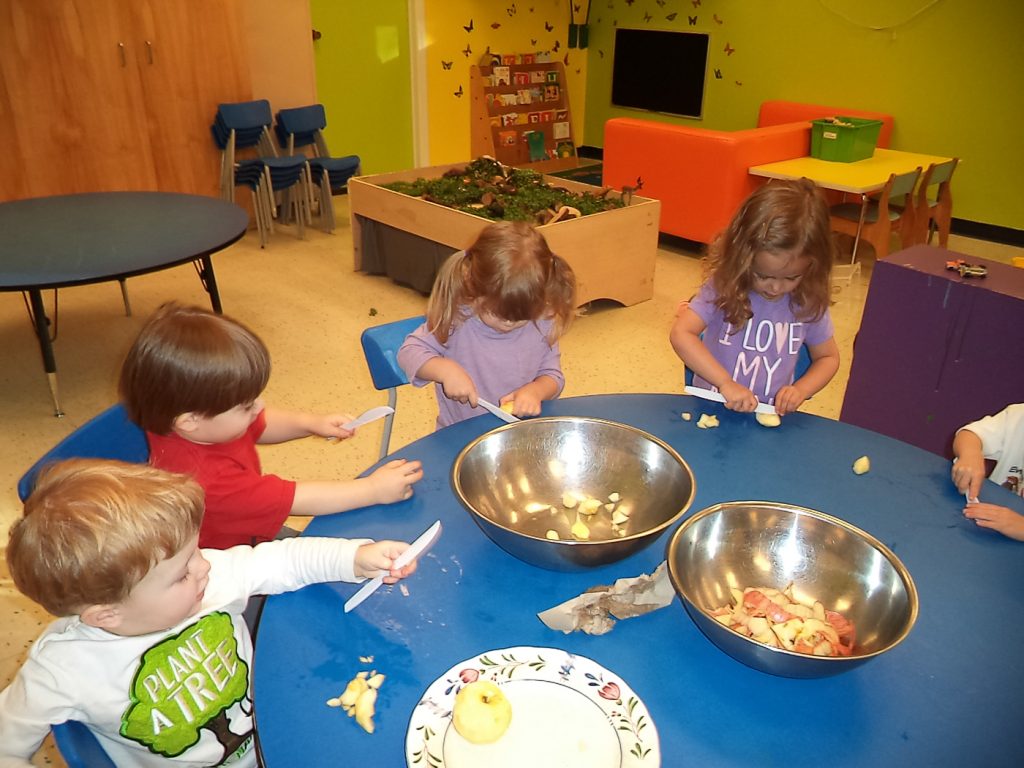
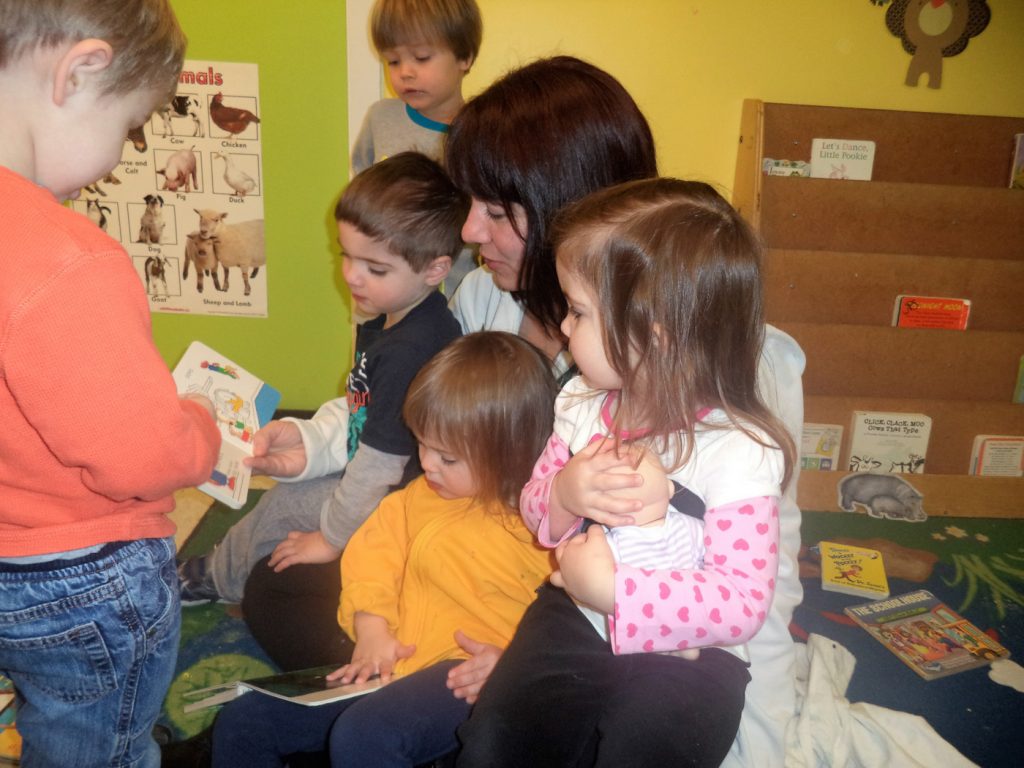
Sleep/Rest Time
The need for rest and sleep varies greatly at different ages and even among children of the same age; however, rest is an important part of the day for all children. In our program, children are not required to sleep but are encouraged to rest quietly on their cots. Families are asked to bring a blanket from home and a soft sleep toy is always welcomed. The children are helped to settle on their cots after lunch. Sometimes just sitting beside a child is all the help that is needed and sometimes we will offer the calming touch that will help the child relax and calm their body. Each child is different and we respect their individual need for sleep. The children who rest for shorter times enjoy a quiet yet engaging Wakers’ Program where quitter activities are provided. The children who have not woken on their own by the end of rest period (3:00 pm at the latest) are gently woken. We appreciate that some children take longer to wake than others and love the opportunity to give cuddles at this time.
Toileting
Bathroom time is scheduled three times each day, but of course is also open ended for whenever the need may arise. As with all developmental milestones, toilet learning happens at different times for everyone. Some children come to the Junior Program already diaper free. Together with families we work patiently with the children when they show us that they are ready to leave the diapers behind. As the children master this skill, we ask that parents bring LOTS of extra clothes and shoes that are easily washable as accidents do happen! Our goal is to have every child move from diapers to underpants as appropriate before they move out of our program. We have lots of different tips and tricks and look forward to working with you as your child takes this exciting step.
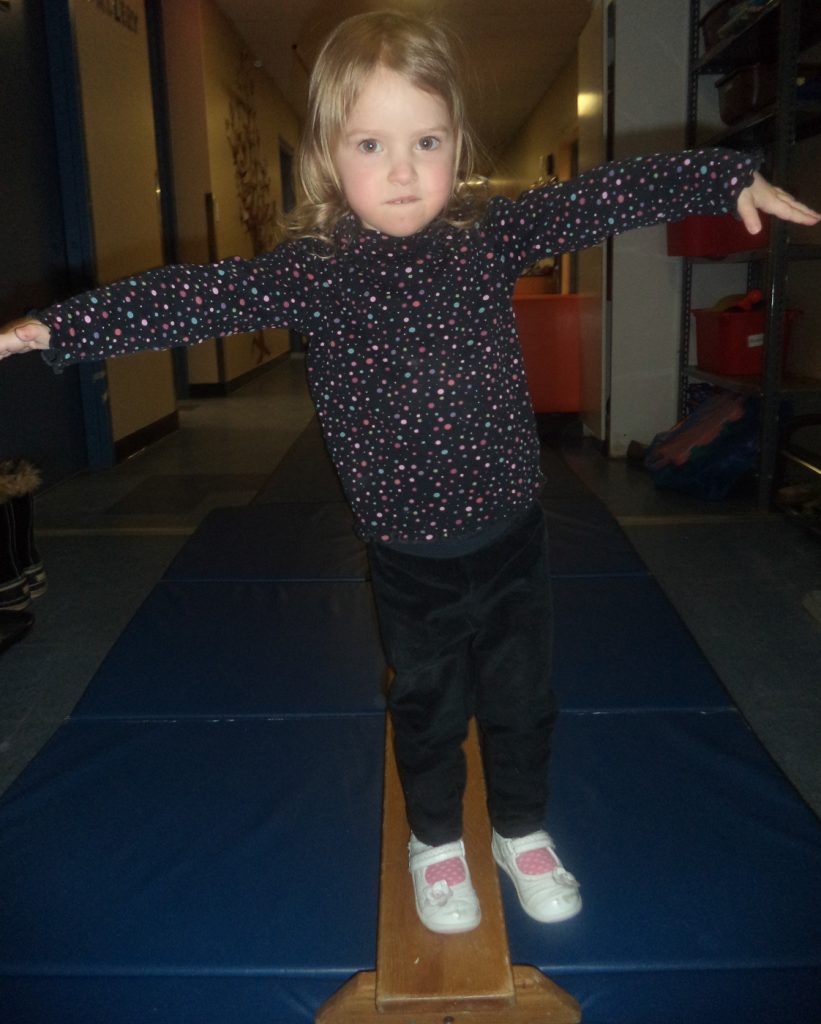
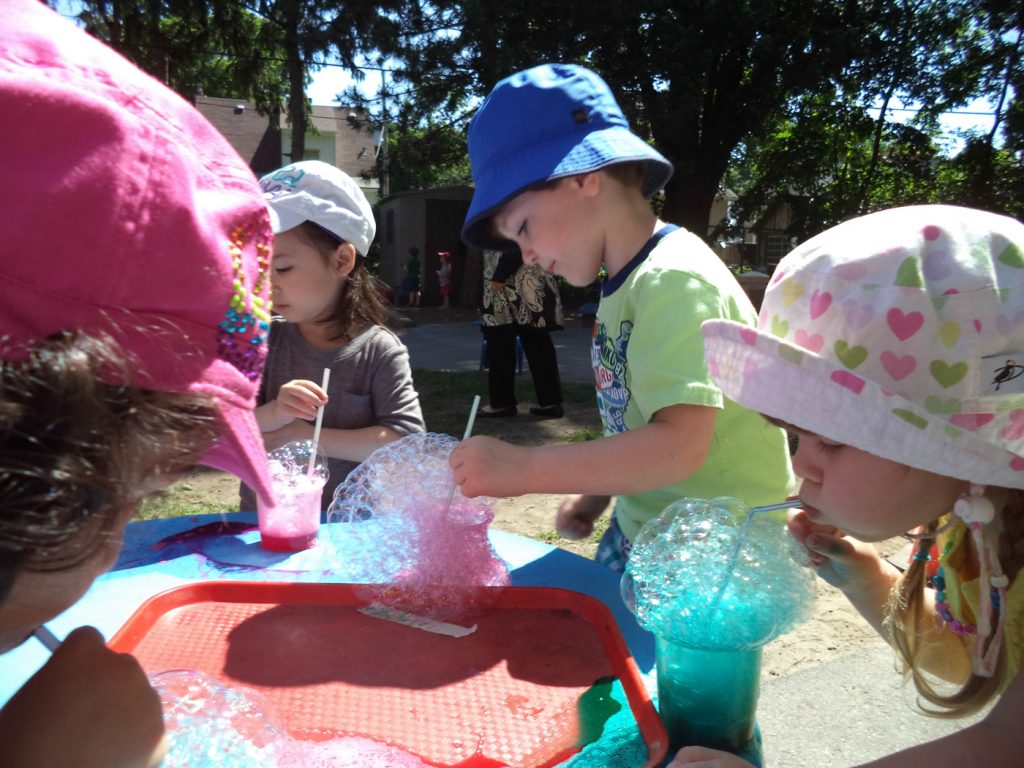
Outdoor Activities
We are outside twice a day, in the morning and in the afternoon, for about an hour each time. Our yard is designed for many types of play such as climbing, performing on the stage, playing in the sandbox and using their imaginations. We have many outdoor toys to foster physical development such as balls, ride-ons, hula-hoops, pylons, sleds, shovels, and wagons. We especially love water play in the warm summer months, walks around the neighbourhood or visiting Clare Park. When it is too cold in the winter or too hot in the summer, we have the luxury of a gross motor room at our disposal. This allows us to burn off energy using our big muscle groups with activities such as ride-on toys, balls, tumble mats, and dancing.
Curriculum
Our curriculum is developed on a weekly basis and is continually updated throughout the week. We consider it a living document because we are always taking cues from the children’s interests in determining which way our programming will go. An interest may last for weeks at a time and continue to be explored through different activities and mediums before it is time to move on, or may last only a day or two before the children lose interest and are ready to take a different path. The curriculum plan is posted outside of our classroom on the Parent Info Board.
We are very excited to offer our children an introduction to the French language twice a week with our center’s French Teacher. We want to spark the children’s’ interest in the French language and prepare them for increased exposure to French as they move through our programs. Our French program is a basic introduction of vocabulary and concepts that is enjoyed through songs, stories, and games.
Things to Bring
In order to ensure a successful and comfortable day we ask that parents provide the following:
- Appropriate seasonal outdoor clothing
- Three complete extra sets of clothing (shirt, pants, underwear, socks)
- 1 Pair of outdoor shoes (Reminder: flip flops are not encouraged)
- 1 Pair of indoor shoes (Labelled INDOOR)
- Sunscreen (Parents are responsible for applying sunscreen at home in the AM, the Educators reapply in the afternoon)
- Seasonal hat
- Diapers/pull-ups, wipes, and diaper cream if required
- Blanket for sleep time, one sleep toy if desired
- Backpack
- Spill-proof water bottle that is easy for your child to manipulate on their own
Daily Schedule
Routines and consistency are important for the children however we are always ready for unexpected changes and events.
| 7:30 | Program opens/Free play, prepared learning centres |
| 8:30 | Morning snack is offered |
| 9:00 | Bathroom routine |
| 10:00 | Dressing for outdoor play |
| 10:15 | Outdoor play (Fridays come in @ 11:00 for French) |
| 11:15 | Changing for indoor play, bathroom routine, hand washing |
| 11:30 | Circle time (Fridays French 11:15-11:45) |
| 11:45 | Lunchtime |
| 12:15 | Clean up, bathroom routine |
| 12:45 | Settle on beds |
| 1:00 | Rest Period |
| 2:30 | Wakers’ bathroom routine |
| 3:00 | Circle time |
| 3:15 | Snack offered |
| 3:30 | Bathroom routine, hand washing |
| 3:45 | Dressing for outdoor play |
| 4:00 | Outdoor play |
| 5:15 | Children prepare for pickup |
| 5:30 | Program closes |
Full Time Child Care Program Parent Handbook
Fees
The daily rate for the full time Junior Preschool Program is $51.51 (2016)
Full Time Senior Preschool Program
The Senior Preschool Program operates for children aged 3 to 4.5 years, with space for a total of 16 children. The Educator-to-child ratio is 1:8 from 9:00am to 3:30pm and can go to 1:10 outside those hours.
This program focuses on ensuring that the children are ready for elementary school. Our dedicated team of Educators encourage and support the children as they explore the world and build on their knowledge and understanding through inquiry-based activities. Each day the children will be provided opportunities for learning as well as story times, large and small group times, gross motor play and free play activities. Each week the Educators present teacher-directed learning centers that build communication skills, printing skills, turn-taking skills and help practice working at a desk.
In the Senior Preschool Program the children have the opportunity to express their thoughts and ideas, make choices and ask and answer questions as a way to satisfy their curiosity and build problem solving skills. They are also encouraged to recognize and consider the views of their peers and build and solidify friendships to help strengthen their social skills.
Our goal is to support and encourage the children as they develop their independence so that they are better equipped to manage in the larger school environment.
The Home Child Care and Centre based programs work with the City of Ottawa Child Care Registry and Waitlist (CCRAW) when there are spaces available.
We do have some priorities that we consider when inviting new families to join us. In order of priority, we:
- Meet the needs of the children currently enrolled
- Welcome siblings of children currently enrolled
- Welcome other Mothercraft service user
- Welcome families new to Mothercraft
Families who are interested in any of our programs are asked to visit the City of Ottawa’s Child Care Registry and Wait List and apply by selecting their Mothercraft program of choice.
Curriculum
Our team of two full time and one part time Educators work together to create a challenging and enjoyable environment in which your child can grow and learn through play. Through play the children develop social and cognitive skills, they mature emotionally and gain the self-confidence needed to engage in new experiences and environments.
In our program we begin to introduce the children to some more structured activities to ensure that they are ready for their next step of moving to our Mothercraft Kinder Program or moving on to new adventures in the school system.
We introduce the children to the concept of the “school year”. From September to June our goal is to construct a curriculum which fosters cognitive growth based on the children’s own interests and ideas. July and August are full of fun outdoor summer activities as we enjoy a “summer holiday” atmosphere.
Learning Experiences
We encourage the children to explore their world and build on their knowledge and understanding through inquiry-based activities. Opportunities for learning are incorporated into all our daily routines, as well as story times, large and small group times, and gross motor play.
Language Development
Developing the children’s listening and speaking skills provides the foundation for literacy development in Kindergarten. We provide opportunities and encouragement for them to express their ideas, make choices and to ask and answer questions.
The Educators develop small projects from the children’s ideas and interests and present them to the children in what we call Learning Centres. These activities are designed to help build vocabulary; identify the sounds that make up words; recognize letters and some printed words; and associate each letter with the sound that it makes.
Circle Time
We create a framework of books, songs, dancing and games that foster the development of everyday listening skills as well as encouraging the expression of personal experiences, ideas and emotions.
Physical Development
The children are provided with daily periods of free play, where they choose and plan their own activities both indoors and outdoors. Additional organized and co-operative games help to develop their physical skills while enjoying the company of their friends. We have fun learning to play board games, musical chairs, chicken limbo and dancing to the music!
Nutrition
A nutritional lunch is served buffet style. The children build their independence by serving themselves and practicing portion control under our watchful eyes. They practice turn taking and also help define their own likes and dislikes. The children are encouraged to taste everything but are not forced to eat it. Lunch time is very social and we have some awesome conversations about what happened in the morning and what the children are doing at home, etc.
Sleep/Rest Time
The seniors are a busy, active group and need a rest time to refresh and recharge. The need for rest and sleep varies greatly at different ages and even among children of the same age; however, rest is an important part of the day for all children. The children are divided into their two groups (Jellybeans & Lolly Pops) and enjoy a relaxing time of music, stories and quiet activities on their cots.
Information Sharing
A white board is posted outside the classroom to help us share with parents the activities of the day, special events and important notices. Our snack and lunch menu for the week is posted here as well as a daily chart indicating how well your child has eaten and how long they slept.
What to Bring
We ask that parents please provide the following items to ensure that your child is well prepared and comfortable each day.
- A knapsack or bag
- In the bag should be: at least 1 complete set of clothes(top, pants, underwear & socks)
- 1 pair of indoor shoes
- 1 pair of outdoor shoes
- Seasonal hat
- Seasonal outdoor clothing, as we go outside
- Sunscreen (summer)
- Refillable Water bottle
- Blanket for sleep (we will send home on Friday to be washed)
Daily Schedule
| 7:30 | Opening activities ~ all areas are set up to encourage and challenge skill development |
| 8:30 | Snack |
| 9:15 | Learning experiences Monday: learning activities guided by the children’s interests. Tuesday: Physical activities. Wednesday: Learning Centers (designed to promote specific skills such as listening and following directions). Thursday: Writing skills. Friday: Game Day |
| 10:00 | Outside play |
| 11:15 | Outside play |
| 11:45 | Calendar time (Learning the days, months, year, holidays, etc.) |
| 12:00 | Lunch |
| 12:30 | Clean up and bathroom time |
| 1:00 | Sleep & rest time |
| 2:30 | Table top activities ie puzzles, blocks, toy play, etc. |
| 3:00 | Tidy up |
| 3:15 | Snack |
| 3:30 | Afternoon Circle (Songs and storytelling) |
| 4:00 | Outside or inside activities (weather dependent) |
| 5:15 | Tidy up |
| 5:30 | Center closes |
Full Time Child Care Program Parent Handbook
Fees
The daily rate for the full time Senior Preschool Program is $51.51 (2016)

